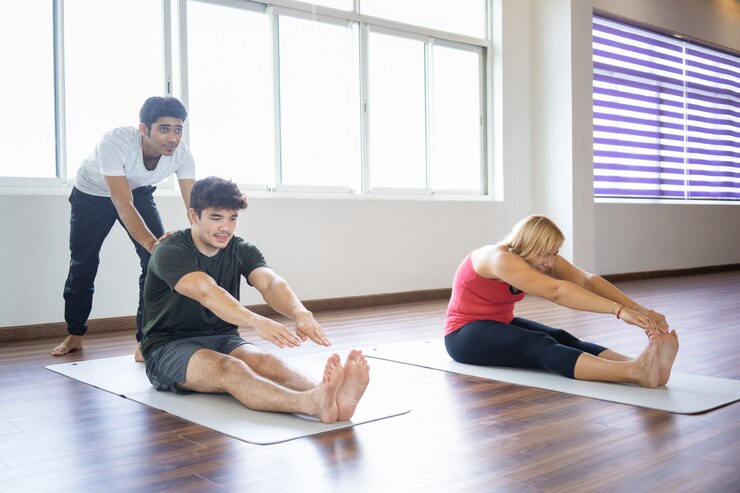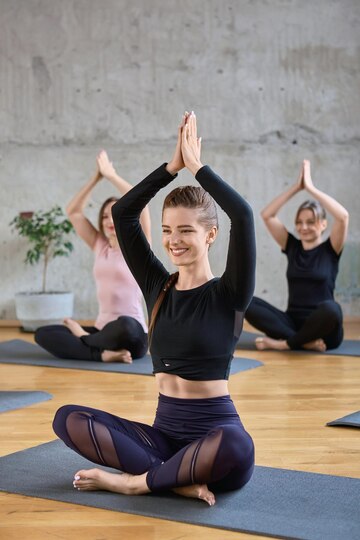Online Yoga Therapy Teacher Training Certificate Course; A Holistic Approach to Healing and Well-being
Name of the Course: Online Yoga Therapy Teacher Training Certificate Course
Language: Our courses will be held in English Medium.
Days: Monday – Friday
Timing: 4:00PM – 6:00PM (02 Hours)
Mode: Online
Course Duration: Two Weeks
Total Fee for the Training(For Indian Citizens Only): INR 38,000
Total Fee for the Training(For Non-Indian Citizens Only): USD 600
Accreditation: Yoga Alliance, USA, YACEP.
About the course facilitator: S. Karuna Murthy, M.Sc., Ph.D., E-RYT 500, YACEP
What you will get?
Yoga Manual (01)
Certificate
Yoga Training
Excluded with accommodation and food
For Further Consultation: Please Contact Us (karunaayoga@gmail.com or +91 9686549129)
Online Yoga Therapy Teacher Training Course Overview
Online Yoga Therapy Teacher Training Course Overview
Online Yoga Therapy Teacher Training Courses are designed to equip individuals with the knowledge and skills necessary to guide others through yoga therapy sessions.
Yoga Therapy: A Holistic Approach to Healing and Well-being
Yoga therapy is a holistic healing practice that integrates traditional yogic principles with modern therapeutic techniques to promote physical, mental, and emotional well-being. It is an individualized and adaptive approach that considers the unique needs of each person, aiming to restore balance and harmony in body and mind. With its roots in ancient Indian traditions, yoga therapy has evolved into a recognized complementary and alternative medicine (CAM) modality, widely used to manage stress, chronic illnesses, and mental health disorders. This essay explores the history, principles, techniques, benefits, and scientific evidence supporting yoga therapy while also highlighting its applications and future potential.
History and Evolution of Yoga Therapy
Yoga has been practiced for over 5,000 years, with its origins traced back to the Indus Valley Civilization. The foundational texts, such as the Vedas, Upanishads, and Patanjali’s Yoga Sutras, outline the philosophical and practical aspects of yoga. Traditionally, yoga was a spiritual discipline aimed at self-realization and enlightenment. However, over time, its therapeutic benefits became widely recognized.
The modern concept of yoga therapy was pioneered by notable figures such as Swami Kuvalayananda, T. Krishnamacharya, B.K.S. Iyengar, and T.K.V. Desikachar. These yogis adapted traditional practices to suit medical and therapeutic applications. In the mid-20th century, scientific studies began to explore yoga’s physiological and psychological benefits, leading to its integration into Western healthcare systems. Today, yoga therapy is practiced globally, with certified therapists working alongside medical professionals to provide holistic care.
Principles of Yoga Therapy
Yoga therapy operates on several core principles that distinguish it from general yoga practice:
Individualized Approach– Unlike general yoga classes, yoga therapy is tailored to an individual’s specific health concerns and physical abilities.
Holistic Healing– Yoga therapy addresses the body, mind, and spirit, aiming for overall well-being rather than symptom management alone.
Self-Empowerment– The practice encourages individuals to take an active role in their healing process through self-awareness and self-care.
Integration with Medical Care– Yoga therapy complements conventional treatments and can be used alongside medical interventions.
Adaptability– Practices are modified based on age, fitness level, and health conditions, ensuring safety and effectiveness.
Techniques and Practices in Yoga Therapy
Yoga therapy employs a wide range of techniques to promote health and healing. These techniques include:
Asanas (Physical Postures)– Specific poses are prescribed to strengthen muscles, improve flexibility, and enhance bodily functions.
Pranayama (Breathwork)– Controlled breathing techniques regulate the nervous system, reduce stress, and improve respiratory function.
Meditation and Mindfulness– These practices promote mental clarity, emotional stability, and relaxation.
Yoga Nidra (Yogic Sleep)– A deep relaxation technique that aids in reducing anxiety, stress, and sleep disorders.
Mantras and Chanting– Sound vibrations from chanting have therapeutic effects on the mind and emotions.
Ayurveda and Diet Recommendations– Yoga therapy often incorporates dietary and lifestyle suggestions from Ayurveda to enhance healing.
Mudras and Bandhas– Hand gestures and energy locks are used to channel and balance the body’s energy flow.
Guided Visualization– This technique helps individuals reframe negative thought patterns and enhance healing potential.
Benefits of Yoga Therapy
Yoga therapy provides numerous benefits for physical, mental, and emotional well-being. Some of the key benefits include:
1. Physical Health Benefits
Chronic Pain Relief– Helps manage conditions such as arthritis, fibromyalgia, and back pain.
Improved Cardiovascular Health– Lowers blood pressure, improves circulation, and reduces heart disease risk.
Enhanced Respiratory Function– Beneficial for asthma, chronic obstructive pulmonary disease (COPD), and other lung conditions.
Strengthened Immune System– Reduces inflammation and enhances the body’s natural defense mechanisms.
Better Digestive Health– Aids in managing conditions like irritable bowel syndrome (IBS) and acid reflux.
2. Mental and Emotional Well-being
Stress Reduction– Activates the parasympathetic nervous system, promoting relaxation and reducing stress hormones.
Anxiety and Depression Management– Improves mood, increases serotonin levels, and reduces symptoms of mental health disorders.
Enhanced Cognitive Function– Increases focus, memory, and overall mental clarity.
Better Sleep Quality– Helps combat insomnia and promotes restful sleep.
3. Holistic and Spiritual Benefits
Increased Self-Awareness– Encourages introspection and mindfulness.
Emotional Balance– Helps in managing emotions and improving relationships.
Sense of Purpose and Well-being– Supports personal growth and a deeper connection with oneself.
Why To Take Online Yoga Therapy Teacher Training Course
1. Flexible Learning Schedule
Online courses allow you to learn at your own pace, making it easier to balance your studies with work, family, or other commitments.
You can revisit recorded sessions and study materials anytime.
2. Access to Expert Teachers Worldwide
Online training gives you the opportunity to learn from highly qualified and experienced yoga therapists from around the world, whom you might not have access to in your local area.
3. Cost-Effective
Online courses are often more affordable than in-person training because you save on travel, accommodation, and other expenses.
4. Deepen Your Understanding of Yoga Therapy
Learn how to use yoga as a therapeutic tool to help individuals with physical, emotional, and mental health conditions.
Gain knowledge in anatomy, physiology, Ayurveda, and yoga philosophy tailored to therapeutic applications.
5. One-on-One Mentorship & Support
Many online programs offer personalized mentorship and group discussions, allowing you to get direct feedback on your progress.
6. Global Certification & Accreditation
Yoga Therapy TTCs are accredited by Yoga Alliance,USA YACEP.
7. Integration into Your Current Teaching or Healing Practice
If you’re already a yoga teacher, therapist, or healthcare professional, online yoga therapy training can help you integrate therapeutic techniques into your existing practice.
8. Self-Paced Learning for Deep Absorption
Unlike intensive in-person courses, online learning allows you to absorb and apply the teachings gradually, ensuring a deeper understanding.
9. Safe & Comfortable Learning Environment
Learn from the comfort of your home, without the stress of travel or adapting to new locations.
10. Opportunities for Practice & Case Studies
Many online programs include practical case studies and guided sessions to help you apply what you learn in real-life therapeutic settings.
What Will You Learn?
1. Foundations of Yoga Therapy
Differences between yoga therapy vs. general yoga teaching
Principles of therapeutic yogaand its applications
Understanding the healing potential of yogafor various conditions
2. Anatomy & Physiology (Therapeutic Perspective)
Functional anatomy: musculoskeletal, respiratory, nervous, and digestive systems
How yoga impacts joints, muscles, and organs
Biomechanics of movementand injury prevention
Understanding chronic pain and how yoga therapy helps
3. Yoga for Common Health Conditions
Musculoskeletal Issues(back pain, arthritis, scoliosis, osteoporosis)
Mental Health & Emotional Well-being(stress, anxiety, depression, PTSD)
Chronic Conditions(diabetes, hypertension, heart health)
Digestive & Endocrine Disorders(IBS, thyroid imbalances, PCOS)
Women’s Health & Prenatal/Postnatal Therapy
Respiratory Disorders(asthma, sinusitis, lung health)
4. Yogic Practices for Healing
Asana (Therapeutic Postures)for different body types and health conditions
Pranayama (Breathwork Techniques)for stress reduction and energy balance
Meditation & Mindfulnessfor mental clarity and emotional healing
Mudras & Bandhasfor energetic balance
Relaxation Techniques (Yoga Nidra & Deep Rest Practices)
5. Ayurvedic & Holistic Approach to Healing
Introduction to Ayurveda and Dosha balancein yoga therapy
Lifestyle recommendations based on individual needs
The role of diet, herbs, and daily routinein healing
6. Trauma-Informed & Mental Health Yoga Therapy
Understanding trauma and the nervous system
Yoga for PTSD and emotional resilience
Safe and supportive teaching methods for sensitive populations
7. Case Studies & Practical Application
How to assess students/clientsfor yoga therapy
Designing personalized yoga therapy programs
Working with real-life case studiesto gain hands-on experience
8. Ethics & Professional Development
Ethics and scope of practice in yoga therapy
Building a career as a certified yoga therapist
Legal considerations and working with healthcare professionals
Highlights Of An Online Yoga Therapy Teacher Training Course
Flexible Learning– Study at your own pace with live & recorded sessions.
Expert Faculty– Learn from experienced yoga therapists and medical professionals.
Therapeutic Approach– Focus on healing chronic conditions, injuries, and mental well-being.
Anatomy & Physiology– Deep understanding of body mechanics and how yoga heals.
Practical Case Studies– Work with real-life scenarios to apply your knowledge.
Ayurveda & Holistic Healing– Integrate Ayurvedic principles for mind-body balance.
Breathwork & Meditation– Learn powerful techniques for emotional and physical healing.
Trauma-Informed Practices– Safe, inclusive, and supportive teaching methods.
International Certification– Get accredited by Yoga Alliance, IAYT, or other global bodies.
Career & Business Guidance– Learn how to build a career as a yoga therapist.
ELIGIBILITY FOR AN ONLINE YOGA THERAPY TEACHER TRAINING COURSE
Certified Yoga Teachers (RYT 200 or higher) – Those with a 200-hour or 300-hour Yoga Teacher Training (YTT) from a recognized school (Yoga Alliance, IAYT, etc.).
Health & Wellness Professionals– Physiotherapists, doctors, nurses, psychologists, counselors, or holistic healers who want to integrate yoga therapy into their practice.
Serious Yoga Practitioners – Dedicated yoga students with a strong personal practice, even if they are not certified teachers.
Some programs accept students without a YTT if they have a deep interest in therapeutic yoga.
Personal Healing & Growth Seekers– Individuals looking to use yoga therapy for self-healing (chronic pain, stress, emotional well-being) may be accepted in some programs.
Basic Understanding of Yoga– Familiarity with asanas, pranayama, and yoga philosophy is often required.
Commitment to Learning– Since yoga therapy requires deep study, students should be ready to engage in theory, practice, and case studies.
English Proficiency– If the course is conducted in English, a basic understanding of the language is necessary for effective learning.
PREREQUISITES FOR AN ONLINE YOGA THERAPY TEACHER TRAINING COURSE
Yoga Teaching Certification (RYT 200 or equivalent)– Most programs require a 200-hour YTT certification from a recognized school (Yoga Alliance, IAYT, etc.).
Regular Yoga Practice– A minimum of 1-2 years of consistent yoga practice is often recommended.
Basic Knowledge of Anatomy & Yoga Philosophy – Familiarity with yoga anatomy, asanas, and foundational yogic concepts like the 8 Limbs of Yoga, Pranayama, and Meditation.
Commitment to Learning– Yoga therapy involves in-depth study, so students should be prepared for theory, case studies, and self-practice.
ONLINE CLASS REQUIREMENTS FOR A YOGA THERAPY TEACHER TRAINING COURSE
A Stable Internet Connection– A minimum speed of 5-10 Mbps is recommended for live Zoom or video sessions.
Laptop, Tablet, or Smartphone– A computer or tablet is ideal for viewing study materials and participating in live sessions.
Webcam & Microphone– Required for interactive classes, group discussions, and assessments.
Headphones or Earphones– Helps with clear audio and focus during online lectures.
Zoom, Google Meet, or Other Video Platform– Most courses use Zoom for live classes, so ensure it’s installed.
Quiet Practice Space– A comfortable, distraction-free area for yoga and meditation.
Yoga Mat– Essential for asana practice.
Props (If Needed)– Some courses require blocks, straps, bolsters, cushions, or a chair for therapeutic practices.
Notebook & Pen – Useful for taking notes on theory and case studies.
Access to Course Portal– Many programs provide a student login for study materials, recordings, and assignments.
E-books, PDFs, or Printed Manuals– Some courses offer digital manuals, while others recommend textbooks.
Ability to Record & Save Notes– Some courses allow students to record lectures for future reference.
Basic Tech Skills– You should be comfortable using email, video conferencing, and file downloads.
Time Commitment– Online Yoga Therapy TTCs require dedicated self-study, practice, and live sessions.
Good Lighting & Camera Setup– For live practice and feedback from teachers.
SYLLABUS FOR AN ONLINE YOGA THERAPY TEACHER TRAINING COURSE
1. Introduction to Yoga Therapy
What is Yoga Therapy?Difference between yoga teaching & yoga therapy.
Scope & Ethics of a Yoga Therapist– Understanding professional boundaries.
History & Evolution of Yoga Therapy– Traditional vs. modern approaches.
2. Yoga Foundations for Therapy
The Five Koshas & Healing– (Physical, Energy, Mental, Wisdom, Bliss layers).
The Eight Limbs of Yoga– As per Patanjali’s Yoga Sutras.
Pranayama & Nervous System Regulation– Breath as a tool for healing.
Meditation & Mindfulness– Role in emotional and mental well-being.
3. Anatomy & Physiology (Therapeutic Perspective)
Musculoskeletal System– How yoga affects joints, muscles, spine, and posture.
Nervous System & Pain Management– Understanding chronic pain, stress, and trauma.
Respiratory, Digestive & Endocrine Health– How yoga influences internal organs.
Circulatory & Immune System– Yoga for boosting heart health and immunity.
4. Yoga Therapy for Common Health Conditions
Musculoskeletal Issues– Back pain, arthritis, scoliosis, osteoporosis.
Mental Health & Emotional Well-being– Anxiety, depression, PTSD, trauma.
Chronic Illnesses– Diabetes, hypertension, cardiovascular conditions.
Women’s Health– PCOS, menopause, prenatal & postnatal yoga therapy.
Digestive Disorders– IBS, acid reflux, gut health improvement.
Respiratory Disorders– Asthma, sinusitis, lung function enhancement.
5. Therapeutic Asana, Pranayama & Relaxation Techniques
Asana Modifications & Props Usage– Making postures accessible.
Restorative Yoga & Yin Yoga– Slowing down for healing.
Chair Yoga & Bed Yoga– For seniors and those with limited mobility.
Breathwork (Pranayama) Techniques– For nervous system balance.
Yoga Nidra & Deep Relaxation– Tools for emotional healing & stress relief.
6. Ayurveda & Yoga Therapy Integration
Introduction to Ayurveda– Doshas, Prakriti (constitution), and balance.
Lifestyle & Nutrition– Simple Ayurvedic self-care for well-being.
Personalized Yoga Therapy Based on Dosha– Customizing practice for individuals.
7. Trauma-Informed Yoga Therapy & Mental Health
Understanding Trauma & the Brain– Nervous system responses to stress.
Creating a Safe & Supportive Healing Space– Teaching with compassion.
Yoga for PTSD & Emotional Resilience– Somatic healing techniques.
8. Practical Case Studies & Client Assessment
How to Assess a Yoga Therapy Client– Observation & interview techniques.
Designing a Personalized Yoga Therapy Plan– Tailoring practice for specific needs.
Live Case Studies & Group Discussions– Applying knowledge to real-world scenarios.
9. Professional Development & Certification
Business & Ethics of Yoga Therapy– How to build a career as a therapist.
Legal & Ethical Considerations– Working with healthcare professionals.
Final Teaching Practicum & Evaluation– To receive certification.
10. Certification & Accreditation
Yoga Alliance (YACEP – Continuing Education Provider)
RECOMMENDED BOOKS FOR YOGA THERAPY TEACHER TRAINING
1. Yoga Therapy Fundamentals
“The Heart of Yoga: Developing a Personal Practice” – K.V. Desikachar
A must-read on yoga as therapy, emphasizing breath-centered practice.
“Yoga as Medicine: The Yogic Prescription for Health and Healing” – Timothy McCall, M.D.
Covers how yoga therapy can treat various medical conditions.
“Yoga Therapy: A Guide to the Therapeutic Use of Yoga and Ayurveda for Health and Fitness” – Mark Stephens
A comprehensive book on structuring yoga therapy sessions for various conditions.
5. Anatomy & Physiology for Yoga Therapy
“The Key Muscles of Yoga” & “The Key Poses of Yoga” – Ray Long
Excellent books with detailed anatomy and biomechanics of yoga postures.
“Yoga Anatomy” – Leslie Kaminoff & Amy Matthews
Explores how breath and movement impact the body in yoga.
“Functional Anatomy of Yoga: A Guide for Practitioners and Teachers” – David Keil
Helps understand movement mechanics in yoga therapy.
9. Ayurveda & Holistic Healing
“Ayurveda and Yoga Therapy”– David Frawley
Explains the connection between Ayurveda, yoga, and therapeutic healing.
“Prakriti: Your Ayurvedic Constitution” – Robert Svoboda
A guide to Ayurvedic body types and lifestyle adjustments for healing.
“The Ayurvedic Guide to Yoga” – Scott Gerson
Integrates Ayurveda into yoga therapy practice.
13. Yoga for Mental Health & Trauma-Informed Therapy
“The Body Keeps the Score: Brain, Mind, and Body in the Healing of Trauma” – Bessel van der Kolk
A must-read on how trauma affects the body and how yoga can help.
“Overcoming Trauma through Yoga: Reclaiming Your Body” – David Emerson & Elizabeth Hopper
A practical book on trauma-sensitive yoga therapy.
“Yoga for Depression” – Amy Weintraub
Focuses on using yoga to manage depression and anxiety.
17. Therapeutic Asana, Pranayama & Meditation
“The Therapeutic Yoga Kit” – Cheri Clampett & Biff Mithoefer
Guides restorative and healing postures for therapy.
“The Miracle of Mindfulness” – Thich Nhat Hanh
A simple yet profound guide on mindfulness meditation.
“The Breathing Book” – Donna Farhi
Teaches how breathwork (pranayama) supports healing.
FREQUENTLY ASKED QUESTIONS (FAQ) – ONLINE YOGA THERAPY TEACHER TRAINING
1. What is a Yoga Therapy Teacher Training Course?
A Yoga Therapy TTC is a specialized training program that teaches how to use yoga techniques (asana, pranayama, meditation, and lifestyle practices) to support physical, mental, and emotional healing. It is designed for yoga teachers and health professionals who want to work with individuals dealing with chronic conditions, injuries, stress, and trauma.
2. Who can enroll in an Online Yoga Therapy TTC?
Certified Yoga Teachers (RYT 200 or higher)
Healthcare professionals(physiotherapists, psychologists, nurses, etc.)
Wellness coaches, holistic healers, or Ayurveda practitioners
Dedicated yoga practitioners (some programs allow students without prior teacher training)
3. Is online yoga therapy training as effective as in-person training?
Yes! Many online programs offer live classes, interactive discussions, case studies, and practical assessments. If you choose a well-structured and accredited course, online training can be just as effective as in-person training.
l 4. What are the technical requirements for online classes?
A stable internet connection (5-10 Mbps minimum)
l A laptop, tablet, or smartphone
l Webcam & microphone (for live interactions)
l Zoom or other video conferencing apps
l A quiet space for practice & study
5. What will I learn in a Yoga Therapy TTC?
Therapeutic Yoga Asanas – Modifications & sequencing for different conditions
Pranayama & Breathwork – Healing techniques for stress & respiratory health
Mental Health & Trauma-Informed Yoga – Yoga for anxiety, PTSD, and emotional well-being
Anatomy & Physiology – Musculoskeletal system, nervous system, and chronic pain management
Ayurveda & Holistic Healing – Doshas, diet, and lifestyle practices for balance
Case Studies & Client Assessment – Designing personalized yoga therapy plans
6. Is this training Yoga Alliance or IAYT certified?
Many programs are accredited by Yoga Alliance (YACEP – Continuing Education Provider).
Some advanced programs are certified by IAYT (International Association of Yoga Therapists), which requires a more in-depth curriculum (800+ hours).
Other programs may have their own certifications recognized internationally.
Always check the accreditation before enrolling.
7. What certification will I receive after completing the course?
Depending on the program, you may receive:
Yoga Alliance Continuing Education Certificate (YACEP hours)
Yoga Therapy Certification from the school
8. Can I take this course if I only want to learn for personal healing?
Yes! Some programs allow students to enroll even if they don’t want to become teachers but want to use yoga therapy for their own healing journey.
9. How long does an online Yoga Therapy TTC take?
50–100 hours (Basic Certification) – 1-3 months
200–300 hours (Advanced Yoga Therapy Certification) – 3-6 months
800+ hours (IAYT Accredited Yoga Therapist Training) – 1-3 years
Self-paced courses allow more flexibility, while live programs have scheduled classes.
10. Will I be able to work as a Yoga Therapist after completing this course?
Yes, but it depends on the certification level:
Short courses (50-100 hrs) – Great for adding yoga therapy principles to your existing teaching.
200-300 hrs courses – Qualify you to work with clients in a therapeutic setting.
IAYT 800+ hrs courses – Allow you to work as a Certified Yoga Therapist, often in healthcare environments.
11. How much does an Online Yoga Therapy TTC cost?
Prices range from:
$200 – $500for short introductory courses (50–100 hours)
$600 – $2,000for comprehensive training (200–300 hours)
$3,000 – $7,000for IAYT-certified programs (800+ hours)
